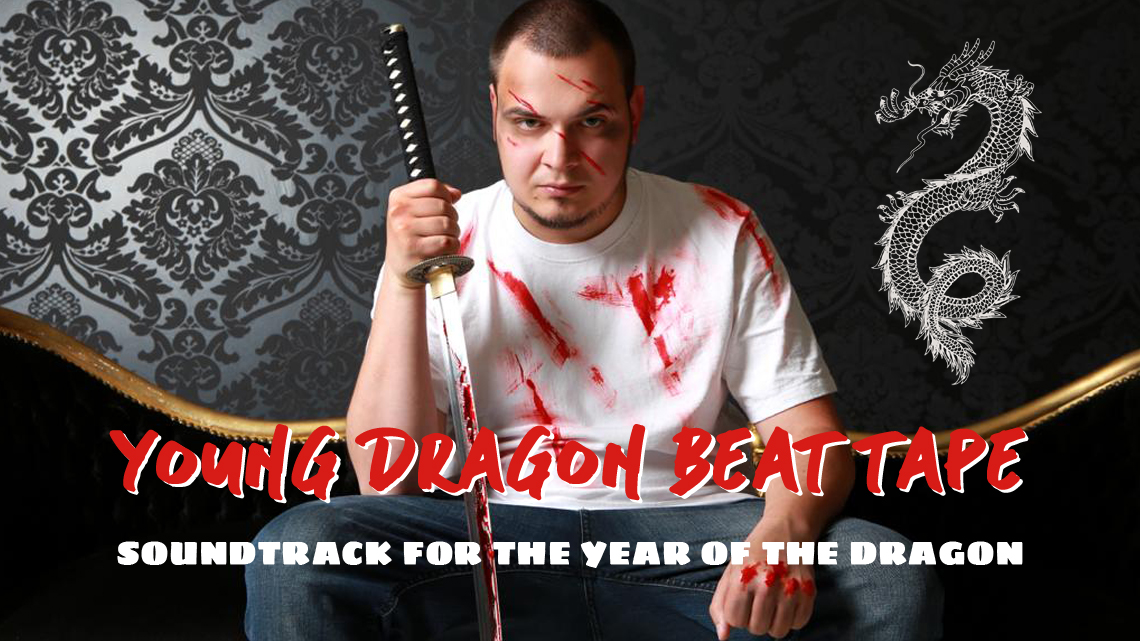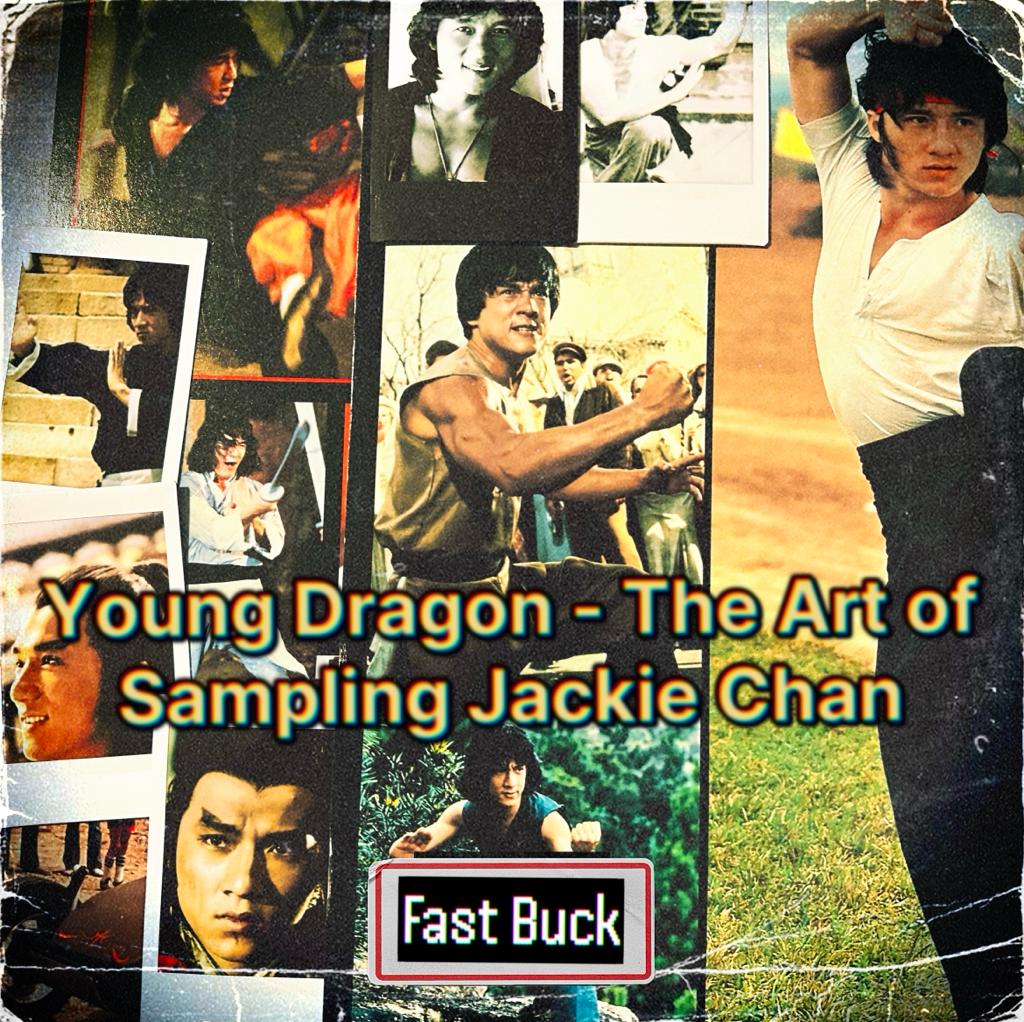
Hip Hop & Martial Arts: The chantastic Soundtrack for the Year of the Dragon 2024
[the following text is a guest post by Tommy Sandrock]
If you’re on a music streaming service of your choice these days and are looking for something new and exciting for your playlist, then I’ve got something for you. As a guest author for www.JackieChan.de, today I’m giving you an exciting overview and insight into my very own chantastic project. Read on to find out what my “Young Dragon Beat Tape” is all about and why you, as Jackie Chan fans, should be so interested in it.
Jackie Chan inspires his fans
My name is Tommy aka Fast Buck. Ever since I was about 10 years old, the sound of American hip-hop has captivated me and hasn’t let go to this day. Something about it just took hold of me like a fever and lodged itself in my ear canals, so that I couldn’t help but become addicted to the entire culture surrounding the rap artists.
A similar experience had only happened once before – at around the same time as my musical awakening, I also discovered the medium of film. To be more precise, it was a certain Jackie Chan who literally blew my mind at some point during one of his numerous placements on linear TV in the 90s.

What I could not have guessed at the time is all the clearer to me today in retrospect: I had encountered the two greatest passions of my life, music and martial arts. Both were to have an impact on me and my nature that can hardly be described in adequate words, which of course I didn’t realise at the time. Today it is and I am very grateful for the opportunity to have found a way to give something back to art.
So, to complete the picture: films became a hobby, Jackie Chan became an idol, and soon my first white belt was tied around my narrow childhood waist. Emulating my hero, I became a karateka, and at the same time countless VHS, DVDs and later Blu-rays found their way onto the shelves at home, which were not yet occupied by CDs and vinyl records of my second great love.
„It’s bigger than Hip Hop“
After all, every training montage in a film also needs a soundtrack – and in my case that was hip-hop. Initially still in English, the rise of German-language rap music in the early 2000s meant that I now also had my own (musical) identity. The stage name “Fast Buck” was quickly born – or rather borrowed from the character of Sammo Hung from “My Lucky Stars”‘s German dubbing “Tokyo Powerman”.
Hip-hop culture has always been widely inspired and reinterpreted elements from other art forms. So it seemed only fitting that I adopt the name of a beloved character to give it a new meaning tailored to me and my work.
Jackie had shown me a similar way by creating his own brand, his own formula, from the often serious kung fu films in his early works, by shaping and influencing the genre with his comedic elements and unprecedented acrobatics and body control. I had the same in mind for my musical career, inspired by his feats I wanted to leave my mark on the genre of my choice.
Today, over two decades later, I can boast at least a partial success – but one that I am very proud of.
Tommy Sandrock aka Fast Buck
But let’s go back to Jackie’s early works for a moment – especially in his Easterns of the 1970s, we often see him training in the woods and meadows and practising his kung fu. Whether it’s the eight drunken gods in “Drunken Master” or the snake technique (e.g. eggs placed on sticks) in “Snake in the Eagle’s Shadow”, not only Jackie’s film characters, but also he himself had to make do with more modest means at this time than was the case in the following years with the big budgets of Golden Harvest.
It was precisely this circumstance – overcoming limitations, creating something completely new from little – that ensured, among other things, that hip-hop culture and Eastern cinema shared a common denominator from the very beginning. It was the musical adaptations of the Wu Tang Clan in the 90s that made the marriage of motifs from hip-hop culture and action films from Hong Kong visible and, above all, audible to the whole world.

Both art forms place a strong emphasis on self-realisation and individuality, offering in their essence a platform to share feelings, thoughts and stories with the world in a powerful way. They have their roots in the rejection of existing norms and the search for free self-determination.
Hip-hop emerged in the streets of New York as a musical protest movement against social injustice and the marginalisation of a predominantly black population that was pushed to the proverbial margins of society in ghettos. At the same time, martial arts films reflected the desire for freedom and justice of Chinese fighters who fought back against centuries of oppression in the form of unarmed combat (kung fu).
If you now add the powerful rhythms of hip-hop and the dynamic movements of martial arts to the equation, the similarities are hardly surprising. Both art forms use the body as a means of expression and rely on a visual language to convey their message.
From rapper to producer
All of this resonated with my youthful self and gave me the strength, the will, the discipline and the self-confidence to achieve my own creative realisation through a fusion of both elements. No sooner said than done – under my stage name Fast Buck, I started releasing German-language rap music, always with a wink in the direction of the films that had inspired me to create.
And just as Jackie always has to learn new fighting techniques in his films in order to become an even better fighter, there was a new, much more powerful sword to forge alongside the finely sharpened blade of my own lyrics – production!
Long before I understood the rappers’ first words, the sound of booming bass and energetic drums had already cast a spell over me. In the same way that the films’ fight scenes were always more fascinating and exciting than the dialogue and story passages, it was now time for me to acquire the skills to produce my own sound.
Like a young Jackie practising his kicks on ropes in the forest, in the following years I learnt the musical tools to produce my own “beats”, which then formed the instrumental basis for my own rap songs. The entire creative process was now completely in my own hands.
Just as Jackie later carried out almost all the jobs on the film set himself, either in whole or in part, I was now in a position to provide my own musical accompaniment and record my own lyrics – to be able to act as my own director as the main actor.
This gave rise to the desire to combine my two biggest musical influences at some point. And that is exactly what has now happened:
I have dedicated an instrumental album to Jackie Chan, which I produced myself!
Tommy Sandrock aka Fast Buck
2024: Soundtrack to the Year of the Dragon

My so-called “Beat Tape” follows a very simple approach: All 15 instrumentals consist of songs that were either part of a Jackie Chan film in the 70s (for example in the soundtrack) or were released in the course of the films (for example in Japan on records that often compiled well-known pop songs into a compilation around the respective film).
All of these songs were “sampled” by me, i.e. rearranged, remixed, so to speak. In hip-hop, sampling is a complete reinterpretation of existing artistic works that creates a new instrumental from all kinds of sources (songs, film snippets, adverts, soundtracks, etc.) within the framework of a beat.
Just as a photographer transforms a subject in the wild into an artistic photo using his techniques, lens, lighting, post-processing, etc., a producer in hip-hop creates a completely new, independent work from any original piece.
The Art of Sampling Jackie Chan
So my idea was to make use of all musically usable sources from the 70s that had a connection to Jackie Chan. These were mainly his films and their (German) soundtracks as well as the aforementioned soundtrack vinyls, which poured a cornucopia of different sounds over me as sample material. I have now created my beat tape from all these sources – that’s what demo tapes were called in the 90s, on which producers compiled their best works.
Or to stay with the comparison to photography – my instrumental album is a kind of collage of many different motifs that have been edited and refined in different ways to create a big whole from the individual photos.
So all that remains for me to say in conclusion is an invitation: If you fancy finding out what it might sound like, why don’t you give it a listen? The album is called…
Young Dragon (The Art of Sampling Jackie Chan)
Note: You can listen to the entire album for free here on YouTube.

The eponymous Young Dragon certainly needs no further explanation. I’m sure you’ll recognise a lot of it if you’ve seen Jackie’s films from the 70s as often as I have. But even if you don’t, feel free to write to me on social media if you want to know exactly which samples I used or where individual elements of the songs came from.
Discovering new music through sampling is an incredibly satisfying and exciting hobby that opens doors to all genres and eras of music. I would really be delighted if sharing my two passions would also give one of you pleasure when listening.
Thank you for your attention and the opportunity to take you into my part of the Jackie Chan Extended Universe (JCEU). By the way, if you don’t want to wait until my second Jackie Beattape is released, I recommend my related tape by Anita Mui, the Madonna of Asia.
4 AM (The Art of Sampling Anita Mui)
Note: You can also listen to this entire album for free here on YouTube.
Fast Buck online

Tommy Sandrock
* 8 May 1991, Chemnitz 🇩🇪
Languages: German, English
Favourite Jackie Chan movie: “Heart Of Dragon” (1985) (German title: “Powerman 3”)
TikTok: @RapFastBuck
Instagram: @Rap_FastBuck
YouTube: @Rap_FastBuck
Spotify: @Fastbuck
Fiebertraum Productions on Instagram: @Fiebertraum.wav
All photos are copyright by Tommy Sandrock and were provided by him exclusively for this article. Further use of this material is not permitted and must be agreed with the author in advance!